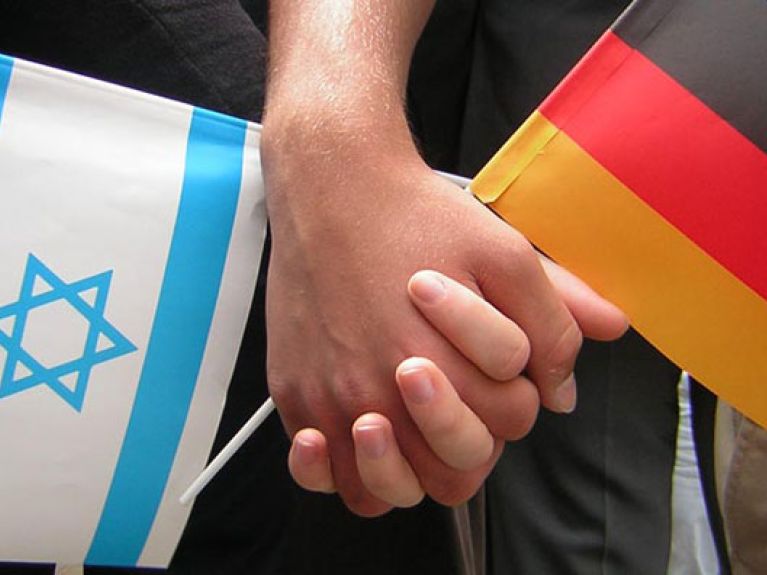What concerns do young persons have in Germany and in Israel? What moves them? To find out the answers to these questions, young people from these countries will go on an expedition in March 2015, accompanied by their movie cameras. Their goal: to make short films showing what's going on right now in Tel Aviv, Jerusalem and Berlin – and in the two countries' societies. The films will be presented at the German-Israeli Youth Congress, which will be staged in May 2015 in both countries to foster discussions among the youth of both countries. “Spotlight on… – 50 Years Israel & Germany“ is the name of the project. It forms part of the program with which ConAct is celebrating the 50th anniversary of diplomatic relations between Germany and Israel.
ConAct's brief since being founded in 2001 has been to facilitate and organize joint activities and encounters. Headquartered in Wittenberg, Saxony-Anhalt, its budget stems from special funds provided by the German government. The center coordinates some 300 projects of exchange a year. They are attended by more than 7,000 participants. The wide range of organizing institutions includes athletic associations, Boy and Girl Scouts and associations of the young supported by political bodies. Municipal institutions and agencies arranging peace promotion and other voluntary services also form part of the range.
“Our brief is to provide these institutions with everything they need to launch and manage these exchange programs,” states Christine Mähler, the head of ConAct. To that end, her center's staff members provide consulting and facilitation services enabling projects of exchange by way of education and instruction. The latter pertain to the training of personnel in techniques of outreach to the young. The staff members also prepare young persons to run groups; they invite participants in extant partnerships to attend joint encounters; and they develop collections of materials to be used by the supervisors of such encounters. “We handle all questions, big and small,” says Mähler, who is a psychologist and mediator by training. “In doing so, we are meeting the need – previously unmet – to provide an interface between the two countries on a sustained basis.“
From football tournaments to seminars on democracy
In 2001, Johannes Rau, the President of Germany at the time, undertook a trip to Israel. During his stay in the country, Rau proposed the broadening and deepening of contacts between young Germans and Israelis. His proposal was quickly turned into a new organization. Its inceptions, however, were difficult. This was due to ConAct's founding's coinciding with the “Second Intifada” including heightened security measures.
“We helped keep the partners in touch during this time,” points out Christine Mähler, taking a look back at that era's events. “Times of crisis highlight the need for solidarity. Expressing such solidarity gives rise to a deep and enduring sense of belonging to each other.”
Many of the project partners have known each other a long time. Each year brings a further ten to 20 partnerships. ConAct and the Israel Youth Exchange Authority – ConAct's partner in the country – stage seminars in Germany and Israel on an annual basis. Invited to attend are institutions engaging in such partnerships. They get to dispatch one representative each. For many of the participants, such seminars provide them with their initial opportunities to get to know the respective host country and its regions. Such seminars also foster private visits.
During such encounters, ideas are developed for joint projects involving their associations, communities and other organizations. Such ideas might take the form of a tournament comprised of friendly matches between two football clubs, or of a series of seminars on democracy and tolerance, as well as of a music-related project.
Since 2001, this program has created some 100 new project-related partnerships. Extensive and finely-tuned processes of match making have facilitated their arrangement. These processes are vital, because the responsible parties on both sides have to get along. Also having to fit are the structures of the organizations.
ConAct is an organization that is embedded in Germany's Ministry for Families, Senior Citizens, Women and Young Persons. ConAct is also supported by the governments of the states of Saxony-Anhalt and Mecklenburg-Western Pomerania. This backing gives ConAct the resources and expertise requisite to optimally team up partners. Since 2010, ConAct has also been the organizer of “Kom-Mit-Nadev”. This program enables young Israelis to volunteer for projects in Germany, in the areas of social work and civil society.
Joint remembrance from a variety of perspectives
The diversity of cultures found in Israel and Germany manifests itself in the activities undertaken by ConAct. The participants include many young Germans whose ethnic backgrounds are in Russia, Turkey and Arabian countries. They have their own ways of looking at the past shared by Germany and Israel. “In such cases, teachers have to take a completely different approach,” states Christine Mähler. For this reason, a large number of ConAct projects expressly take into account this cultural and ethnic diversity among the young. This experience is conveyed both in hands-on seminars and in such manuals as the one created by ConAct and some of its partner organizations on how to work with youth groups. This manual has been extended in cooperation with experts on teaching and on remembrance to encompass methods facilitating commemoration from a variety of perspectives. “We promote the incorporation of the biographies of the participants' families,” explains Mähler. “This gives rise to new relationships and perspectives. These, in turn, augment and enrich our dedication to our jointly-shared history.”


